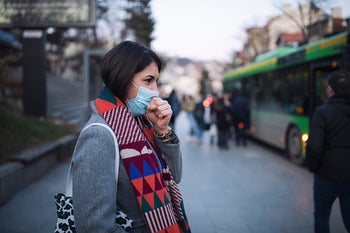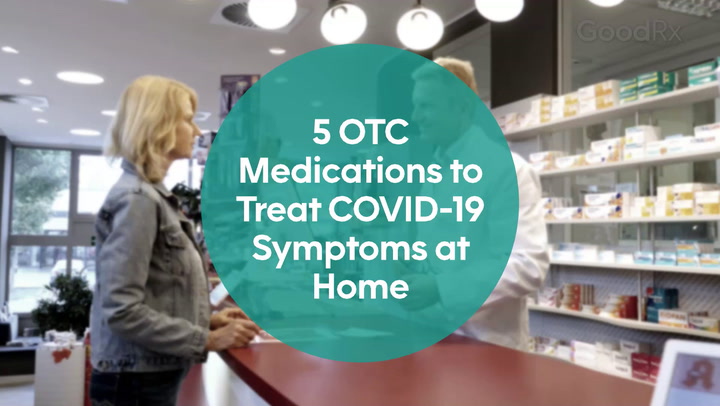Can You Take Tylenol or Advil for COVID Symptoms?
Key takeaways:
Tylenol (acetaminophen), ibuprofen (Advil, Motrin), and other nonsteroidal anti-inflammatory drugs (NSAIDs) are medications used to treat many different health symptoms — including pain and fever.
For most people, Tylenol and ibuprofen are a good choice for treating the symptoms of colds, flu, and COVID-19.
Early in the pandemic, there was concern that taking NSAIDs could worsen the severity of COVID. These concerns faded once more information became available.
Some people may have medical reasons to avoid either one of these medications or to take a reduced dose. Check with a healthcare professional if you’re not sure.
Access savings on related medications
Table of contents
When you’re sick with COVID-19, you have a few treatment options, including prescription antivirals like Paxlovid (nirmatrelvir / ritonavir) and others.
Not everybody is eligible for prescription antivirals, though. Either way, home remedies and over-the-counter (OTC) medications are available. These medications will ease your COVID symptoms of COVID while your body fights the virus. Of these, Tylenol (acetaminophen) and ibuprofen (Advil, Motrin) are some of your best options. Here’s how they work and what to know about treating your COVID symptoms at home.
What are NSAIDs like Advil and Motrin, and how do they work?
Advil and Motrin are brand names of ibuprofen. These belong to a class of medications called NSAIDs (nonsteroidal anti-inflammatory drugs). NSAIDs are used to treat pain, inflammation, and fever. Other examples of NSAIDs are:
Naproxen (Aleve)
Diclofenac (Cambia)
Celecoxib (Celebrex)
Search and compare options
Some NSAIDs, like ibuprofen and naproxen, can be bought OTC. Others, though, need a prescription.
NSAIDs stop inflammation similar to the way steroids (corticosteroids) do. But they’re not part of the steroid drug class (hence the name “non-steroidals”). Importantly, NSAIDs tend to cause less side effects than steroids.
How NSAIDs work
NSAIDs work by blocking key steps in the body’s reaction to injury. Specifically, they block enzymes (proteins) in the cyclooxygenase (COX) pathway. This pathway regulates processes and chemicals involved in fever, pain, and swelling.
The two main COX enzymes (proteins) are called COX-1 and COX-2. These produce hormones called prostaglandins. Prostaglandins are part of the body’s rapid-response system. They trigger emergency healing functions like fever, pain, and inflammation.
NSAIDs slow down the production of prostaglandins. And this stops inflammation before it can start. This makes NSAIDs useful for fighting pain and reducing fever.
Can NSAIDs help COVID symptoms?
Yes. Because of how they work, NSAIDs like ibuprofen (Advil or Motrin) are helpful when you have COVID. Advil and Motrin can help lower a fever. And they can ease sore throat, headaches, and muscle aches associated with COVID. They may also lower inflammation caused by a COVID infection.
Yes, you can take Tylenol and Advil together. This combination of over-the-counter (OTC) painkillers is safe for most people, and it usually provides more relief than either medication alone.
Which nonsteroidal anti-inflammatory drug (NSAID) is best? It depends. Here’s how eight common NSAIDs compare.
Got COVID-19? See our top evidence-based tips for how to get better fast.
Ibuprofen and other NSAIDs aren’t a treatment for COVID though. They’re an example of what healthcare professionals call “supportive treatment.” That means they help support your body and your recovery while your immune system does its thing. But they don’t get rid of COVID.
Is it safe to take ibuprofen if you have COVID?
Yes, it’s safe to take an NSAID like ibuprofen for your COVID symptoms. But there are a few things to make sure of before you do.
First, don’t take more than the recommended dose. If you take NSAIDs regularly for another medical condition, you can continue to take your usual dose if you have COVID.
Second, some people may need to avoid NSAIDs. That could be the case if you:
Are pregnant
Over age 65
Have liver disease
Have Type 2 diabetes
Have heart or cardiovascular problems
Finally, all medications come with risks. And NSAIDs are no different. The serious risks linked to NSAIDs like Advil and Motrin are:
Prolonged bleeding after surgery
Increased risk of a heart attack or stroke
Liver failure
Check with your healthcare professional to see if NSAIDs are safe for you — or whether Tylenol may be a better option.
Despite the risks discussed here, NSAIDs won’t make COVID worse, as you may have heard in the news early on in the COVID pandemic. (Read on to learn more.)
Debunked fears about NSAIDs and COVID
When the COVID pandemic began, there was much the medical community didn’t know about the disease. Before careful studies could be done, hundreds of ideas were shared in the news, over the internet, and in scientific circles. COVID was spreading quickly, and everyone was racing to figure out its secrets.
Among the concerns that came up early on was the idea that NSAIDs could make COVID worse. But since then, experts have examined, questioned, and disputed this idea. Researchers have done many studies to sort out the facts.
A review of about two dozen studies compared people who took NSAIDs and people who didn’t. People taking NSAIDs had about the same risk of catching COVID and being hospitalized for it than people not taking NSAIDs. The length of time spent in the hospital, and the risk of complications, were also similar.
Can Tylenol (acetaminophen) help COVID symptoms?
Much like NSAIDs, acetaminophen (the active ingredient in Tylenol) is a great choice for treating the symptoms of a COVID infection, like fever and body aches. But keep in mind: Like NSAIDs, acetaminophen won’t treat the COVID virus. It just helps to ease the symptoms of the infection.
Acetaminophen isn’t an NSAID. Rather, it’s a different type of medication. It does affect the COX system. However, it doesn’t block COX-1 and COX-2 like NSAIDs do.
It’s thought acetaminophen works on the brain and nerves to change the way the body experiences pain. This makes it helpful for treating pain. And it also helps to lower a fever. But it won’t help to lower inflammation in the same way that NSAIDs do.
Is it safe to take Tylenol if you have COVID?
Tylenol has very few side effects for most people. So it’s typically safe to take for COVID symptoms.
Most Tylenol-associated risks come from taking too much of the medication, which can harm your liver or cause overdose. Tylenol use is also more risky if you drink large amounts of alcohol, regularly or just on one occasion. This is especially the case if you regularly take Tylenol in large amounts.
Which is best for COVID: acetaminophen or ibuprofen?
Acetaminophen and ibuprofen are different medications, and so you don’t have to choose between them. It’s quite safe to take them both together, since they’re different classes of medication. But you must:
Stick to the recommended dose
Make sure you don’t have any medical reasons not to take either medication
These medications tend to work better to ease pain and lower fever when they’re taken together. There’s plenty of good scientific evidence to show that both acetaminophen and ibuprofen are equally safe to use in people with COVID.
The bottom line
Tylenol and ibuprofen are used to treat a wide variety of conditions, including pain and fever. NSAIDs, like ibuprofen, help to lower inflammation too. These medications are available OTC. They’re safe and effective for treating the symptoms of a COVID-19 infection while your body fights the virus. Tylenol and ibuprofen belong to different classes of medication. So, you can safely take both together. But make sure you stick to the recommended doses.
Why trust our experts?



References
Kim, J., et al. (2023). Serious clinical outcomes of COVID-19 related to acetaminophen or NSAIDs from a nationwide population-based cohort study. International Journal of Environmental Research and Public Health.
Perico, N., et al. (2023). Home as the new frontier for the treatment of COVID-19: The case for anti-inflammatory agents. The Lancet Infectious Diseases.
Willsher, K. (2020). Anti-inflammatories may aggravate Covid-19, France advises. The Guardian.
Zhao, H., et al. (2022). Prevalence of NSAID use among people with COVID-19 and the association with COVID-19 related outcomes: Systematic review and meta-analysis. British Journal of Clinical Pharmacology.























